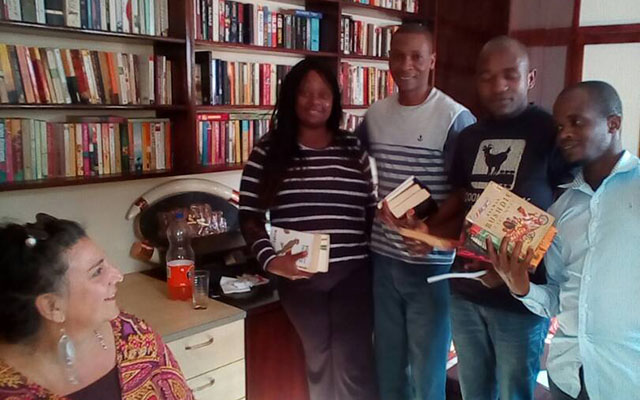Spiwe, writer with a keen eye for a good read


Spiwe Mahachi-Harper
Elliot Ziwira @ The Book Store
On Saturday July 15, 2017, writer Spiwe Mahachi-Harper invited friends and book lovers to her house in Westgate, Harare, for a book sharing event at her expense.
At the Bookstore’s pen Elliot Ziwira was among the guests, who included Albert Chimedza and his wife Antonella, Lawrence Hoba, Monica Cheru-Mpambawashe, Theodora Chirapa, Beniah Munengwa, Sidney Mazwi and his wife Anne.
Here Spiwe (SMH) shares her love for a good read, book collection and other issues with Elliot (EZ).
EZ: Hi Spiwe! Welcome to the Bookstore.

From left. . . Antonella (seated), Theodora Chirapa, Elliot Ziwira, Beniah Munengwa and Lawrence Hoba
SMH: Hi Elliot.
EZ: Am at a loss for words, but how have you come to have such a vast library?
SMH: I read quite a lot, or rather, I used to read at least three books a week, but now social media takes some of my time and I’m lucky if I read a book a week. My library is vast because in the UK where I have been based since 1998, I buy the books that I read, and also because I always think of the many friends and relatives who love reading but cannot always get the books.
In the past I rarely bought books. Whatever books we read were passed on from one person to the other and in the process some of them got lost.
That made it difficult to have a collection of books. In the UK, I live in a closed society. We hardly know our neighbours and we make few friends. I do not have a clue if any of them read, and if they do, what sort of books. So you do not get people borrowing books from each other the way we do in Zimbabwe. Besides, the books are affordable and easy to get.

From left. . . Albert Chimedza, his wife Antonella, Theodora Chirapa and Monica Cheru-Mpambawashe
You just go online, Amazon mostly for me, search for the book you want, click and pay, and the book is delivered right on your doorstep. For those that enjoy the thrill of perusing shelf after shelf of books, there are plenty of bookshops that sell all kinds of literature. Besides these bookshops there are second-hand bookshop where one can get books at very low prices.
The other reason I end up with lots of books on my hands is that I become very sentimental over some of them. These are books that somehow worked their way into my soul and got so deep I feel I must have a copy of them. I have this irrational fear of losing them. If I come across a second copy of such a book going cheaply I just buy it, just in case someone borrows my one copy and “loses” it.
Examples of such copies are “The Stone Virgins and Butterfly Burning” by Yvonne Vera, “The Kite Runner” by Khaled Hosseini, Åsne Seierstad’s “The Bookseller of Kabul”, “Half of a Yellow Sun” by Chimamanda Ngozi Adichie, Bryony Rheam’s “This September Sun” and most of Charles Mungoshi’s books.
EZ: Do you buy a book because you love it, or you buy on impulse?
SMH: I buy books that I know I will enjoy reading, but I’ve bought books in the past because of the media hype and also because back then I thought I should read those books that are reviewed and touted as literary gems, must reads, so to speak. That saw me buying Stephen Hawking’s world-acclaimed book, “A Brief History in Time”; a book about the black hole”. But 10 pages into that book had my head spinning. The guy is a physicist, so I don’t know what I was trying to prove by reading a book that is said to baffle even the brightest of scientists. The book must be covered in dust in the garage now. I have not laid eyes on it in close to two decades.
EZ: Do you have any particular artistes that you prefer, or you simply love a good read?
SMH: I have writers whose works I wait by the printing press for. They can’t write as fast as I read them, but I also love discovering new writers.
Now and again some authors are recommended to me, and off I rush to buy their books.
Only last week we had Robert Muponde talking about Lawrence Hoba’s “The Trek and Other Stories”. I immediately bought it and read it overnight and loved the style of writing and the crafting of sentences in the short stories. Prior to that he had waxed lyrical about “The Jive Talker” by Samson Kambalu. That’s my next read, a book I immediately ordered online.
EZ: Books seem to be off the shelves in Zimbabwe, so where do you get them from?
SMH: I buy them in UK. I brought in most of those books two years ago but each time I come home I bring a dozen or so because I have as many books in Zimbabwe as I have in the UK. Because books are in short supply in Zimbabwe, I’d like to ship all of them back here.
EZ: How long did it take you to amass such a large cache of books?
SMH: A few were bought more than a decade ago. At that time I used to give away the books I’d have read, unless I particularly liked them. But it was in the last five years that I started collecting them with the aim of establishing a library.

A section of Spiwe Mahachi-Harper’s well-stocked library
EZ: You said you have another library in the UK, which is even bigger than the one here at your Westgate home, are the books on the same authors or interests?
SMH: Pretty much the same. I collect classics, books by African writers, Afro-Americans, West Africans, Chinese writers, Asian writers, etc., but these days I have a particular interest in Zimbabwean literature. I collect books on cookery and gardening. I have lots of thrillers and also a few books that I know I won’t ever read, for instance,“Fifty Shades of Grey” by E. L. James; one of those books that I bought because of the hype. But the more reviews I read on it the more I’m convinced it’s not my kind of book. So it’s destined to gather dust on my bookshelf until someone who loves that kind of literature comes to borrow it.
EZ: Would you call yourself an avid read then?
SMH: Most definitely, though I’m slowly down, somewhat.
EZ: What do you look for in a book?
SMH: I look for something deeper than just “once upon a time, this man met that woman and they live happily ever after”. I want a story that takes me places and thrusts me into a world where I marvel at other behaviours and ideas. I want a story that speaks to my emotions. I want to come out of a story having learnt a thing or two. In between reading books that speak to my emotions I read thrillers. A particular favourite of the moment is Simon Kernick. I exhausted all of Mario Puzo’s books and since he’s long dead I no longer wait by his printing press.
EZ: You buy a lot of books and you give them away in the blink of an eye, why?
SMH: I don’t give them away. I loan them out and hope that those who borrow them will be trustworthy enough to bring them back. I do so because I see no point in having a huge library of books that just sit on the shelves and gather dust. That’s being cruel to books. They are meant to be read, enjoyed and loved. My appreciation of books is pretty much like that I have for flowers, although in a somewhat reversed way.
With flowers it’s “don’t pluck them, let them thrive so we enjoy them for longer”. With books “it’s pluck them off the shelves, read them, pass them around”, that way more people get to enjoy them.
EZ: What is your comment on the state of writing and the reading culture in Zimbabwe?
SMH: The younger generation isn’t reading much. This is probably due to a number of reasons; the price of books which is usually higher than in UK. Given the state of the economy, I’m not surprised not many people can spare the money to lavish on books which, as we all know, are a luxury, or a hobby. There are more important things to spend one’s money on.
The other reason is social media. There is so much going on on Facebook, Instagram and various WhatsApp groups. Who needs a solitary activity when you can be actively engaged with like-minded people in real time? It’s not just the young who have fallen victim to social media. I have too. I guess that’s what they call moving with the times.
EZ: What is the inspiration behind your latest book “Tales from the Kombi” (2016)?
SMH: I still see my country through the same eyes, but it’s no longer the place I used to know back then. Sections of it are thriving but there are sections that are not. It’s not just what I see myself, but what others see as well. We long for the Zimbabwe of the first 10 years of independence, where the economy was thriving and our land proudly held the title of being the breadbasket of Africa; a land whose youths graduated from colleges and universities with the hope of getting employed sooner or later, not one where washing a brother’s shirt is considered as employment, (chuckles).
A Zimbabwe where, if you went to hospital you’d be sure to get treated and not be told there is no medical staff, they are either striking for more pay, or they have gone abroad looking for greener pastures, or that there are no drugs. I feel nostalgia for the country I knew back then, one whose town councils ran their towns with pride and made sure they were clean, refuse was collected regularly and the streets were well lit. I am just one of millions who feel this way, and these millions travel by kombi most of the time. The kombi becomes their shared space, one in which strangers bare their souls and find solace in talking about their shared longing for the return to the good old days. These lamentations were the inspiration behind “Tales from the Kombi”.
EZ: The kombi can either take us somewhere, or nowhere, if the journey motif is analysed closely; so is Spiwe Mahachi-Harper’s kombi bound for Nowhere, as in Kenny Rodgers’ “The Gambler”, or Somewhere as in Memory Chirere’s “Somewhere in This Country”?
SMH: Yes, the kombi is either going to take you somewhere, or keep you going round and round in circles. It all depends on the driver, really. He has everyone’s fate in his hands. He can crash the kombi if he so wishes.
EZ: The renowned filmmaker, musician and mbira maker Albert Chimedza, also at the book sharing event here at your Westgate house shared his enthusiasm for art, specifically books in this instance, but how did you two come to know each other? Are you related?
SMH: Oh yea, Albert Chimedza, quite a lovely person, his wife too. I was introduced to him by Monica Cheru-Mpambawashe at an event by the Mbira Institute. Alex Magaisa was giving a talk on colonial trauma, so Monica and I attended. Two days later Albert phoned about some business we had discussed but not reached a conclusion on, so I invited him and his wife to my book event which was on the following day.
Before they left, they had invited Monica and I for a meal and to tour the Mbira Institute. I was amazed and impressed by what they do there.
EZ: And Sidney Mazwi?
SMH: The husband of a very good friend, Anne. Our friendship goes back close to three decades ago. Sidney Mazwi is an avid reader. He’s the one person whose love for reading matches my own. He enjoys reading classics and thrillers. We can sit and discuss books for hours. He’s currently looking for “Grapes of Wrath” (1939) by John Steinbeck, a copy of which I have but I left it in Kadoma.
EZ: You know what Spiwe! I have been looking for Franz Fanon’s “The Wretched of the Earth” (1961) for ages without success. I have been to a lot of libraries but I just could not find it, until I got to your place, and there it was among the hundreds of books in your library. Do you remember how you acquired it?
SMH: As you can see from the state of that book, it’s been passed around a number of times. I quoted from it when I wrote my dissertation at college, close to three decades ago. It’s one of my most treasured books, “The Wretched of the Earth”. You know it was banned during the Smith regime, don’t you?
EZ: Oooh thanks, I didn’t know that it was banned in Ian Smith’s Rhodesia. It is a great book, one that I would treasure as much as you do. And “Hitler’s Last Days” (1945)
SMH: I’m yet to read that one. Of late I’ve taken quite some interest in Hitler’s wars, books on espionage during the World War Two, and double agents. It’s quite an interesting genre, espionage. I have another book published in 1939, not sure if it’s “Grapes of Wrath” or one of those by Rudyard Kipling. They used to belong to my parents, both of whom are deceased now.
EZ: My eye count tells me that At the Bookstore needs at least 15 years to adequately cover all the books in your library here, so how do you intent to read them all, since you are not based in Zimbabwe.
SMH: I’m in and out of Zimbabwe, so I have access to them any time.
EZ: I got seven books and each of the guests went away with at least five books, but it seems as if nothing has been taken at all. How many books could there be in your library, roughly?
SMH: About 600.
EZ: Wow, impressive. And you have about the same number or more in UK?
SMH: Yes.
EZ: I noticed that you have converted your garage to a beautiful library, with an LED television set, top-notch desktop computer and cosy couches, it really must have cost you a fortune?
SMH: Thank you for the compliment. Yeah, it cost me a packet, but it was money well spent.
EZ: Thank you so much for the books and your time Spiwe, the Bookstore is richer now. Happy reading!
SMH: You’re welcome Elliot.







Comments